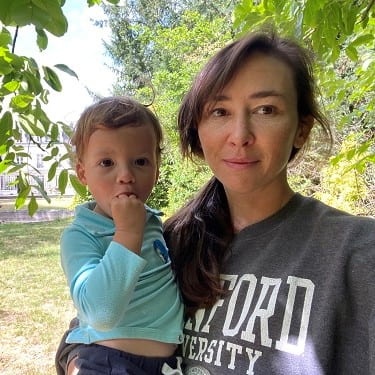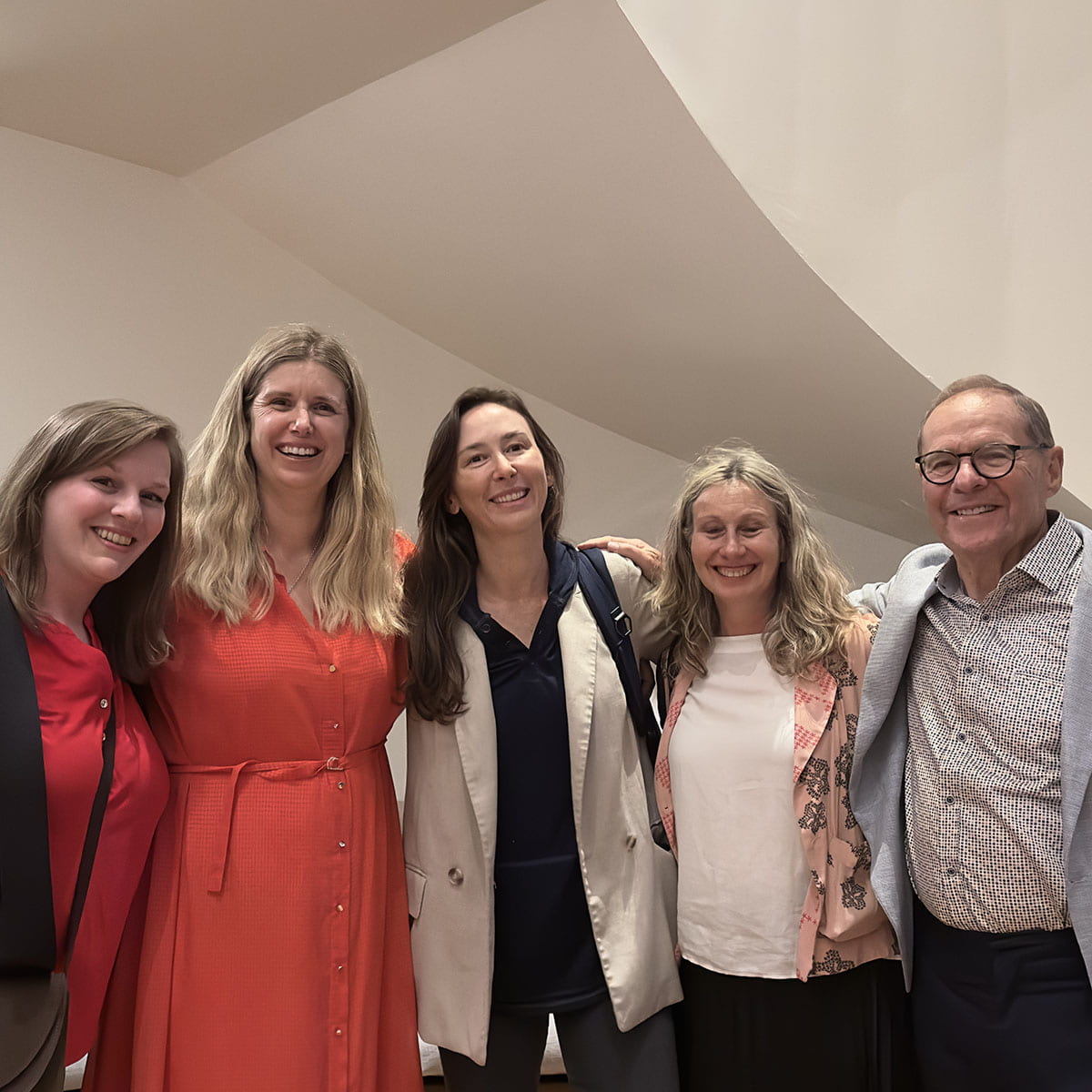
NEWSROOM
Bethanie Maples: Shaking up education with Atypical AI
02 October 2023
A seismic jolt was felt in late 2022 when the power of large language models (LLMs) was unveiled to the general population in the form of OpenAI’s ChatGPT. The aftershocks have been particularly strong for the education sector. Bethanie Maples, Founder and CEO of Atypical AI, one of the humans involved in the Artificial Intelligence (AI) revolution, believes that education has been overdue for a shake-up and AI could be the necessary catalyst that accelerates its transformation.
Bethanie has been studying and working extensively with AI and education, including many years as an executive working on scaling machine learning technologies, researching LLMs and embodied AI at the Stanford Human-Computer Interaction (HCI) labs, five years at Google AI and [Google] X, the Moonshot Factory, where she worked on the AI within Google Classroom, as well as advising the OECD, UNESCO and philanthropic foundations on AI policy, education and technology. Bethanie’s extensive experience positions her as a thought leader on the future of AI and education, making her well-placed to take an entrepreneurial leap and launch her own generative AI platform focused on the education sector. “I wanted the opportunity to move fast and do science-aligned but also edgy things.” Backed by US$4 million in pre-seed money and welcoming Shivon Zilis (former OpenAI Board) to Atypical AI’s board, the company launched in March 2023.
Rather than seeing AI as a threat to education, Bethanie explains the enormous positive opportunity to leverage AI technology to innovate for the benefit of both educators and learners.
Assessment is where Bethanie sees AI facilitating the most impactful change. “Typical grading is failing a lot of people; teachers and learners want change and better outcomes, respectively.” Previously, resource constraints have resulted in a one-size-fits-all approach, and that’s where AI can help. Bethanie advocates strongly for embracing a diversity-first mindset that will benefit all learners. “It’s about removing the totally unnecessary barriers that stop each individual from achieving their personal best.” To illustrate her point, Bethanie points to math anxiety: “A kid might be off sick for a week, they fall behind, they get a bad mark, and then they don’t think that they’re a “math person”. For the rest of their life, they may have increased amygdala responses related to terror around math.” Customising assessments according to an individual’s contextual needs, mental and emotional state, and learning journey could hold the key to fostering successful learning experiences.
Bethanie says that while assessment remains a cornerstone of a university education, the advent of AI necessitates change. “The old concept of writing an essay and simply handing it in is completely dead. When you assess that written essay, you must assume that students have used a machine to write part of it, and you must assess them differently.” However, Bethanie is positive about the change. “Assessment can become much more social, which will be fun and good for learners. For example, having students analyse the grades that an AI gives an essay incorporates both technology and social learning. Conversely, those who don’t embrace change and continue assessing the old-fashioned way will be plagued by people trying to cheat the system.”
Providing high-quality instruction and content to students is another key deliverable universities must maintain. Bethanie suggests educators stand to gain a lot if they are prepared to innovate and embrace AI as a tool. “There is the potential for creating more engaging teaching materials and lesson plans in a fraction of the time, which would result in a general boost in quality and productivity across university systems.” The potential for improved work satisfaction could also arise as staff are able to focus on what they do best.
However, more personalised and enhanced individual learning is only one piece of the AI educational pie, according to Bethanie. “Orchestrating learning between peers, teachers, and the community is another core capability an AI system needs to deliver. Ways in which universities can do that include promoting apprenticeship relationships and supporting co-working spaces and opportunities for collaboration.“
During Bethanie’s time studying for a conjoint Bachelors in Science and Arts at Waipapa Taumata Rau, University of Auckland, she was involved in many co-curricular activities, including the Velocity programme (then Spark) run by the Business School’s Centre for Innovation and Entrepreneurship (CIE). Bethanie continues to support CIE through her assistance with facilitating CIE’s Vanguard programme, an all-expenses paid study tour to Silicon Valley for selected high-potential students.
While Bethanie’s latest entrepreneurial journey has just begun, it is a culmination of years of focused learning and growth, and she encourages others to make the most of their opportunities. “I think entrepreneurship is a mix of both believing in yourself and taking a hard look in the mirror at yourself and asking – what do I need to do to grow?”
Read a Q and A with Bethanie Maples about her time at Stanford

Bethanie Maples, Founder and CEO of Atypical AI
The old concept of writing an essay and simply handing it in is completely dead. When you assess that written essay, you must assume that students have used a machine to write part of it, and you must assess them differently.

Bethanie Maples (centre) with the CIE Vanguard Programme Leaders on their recent study tour of Silicon Valley

Bethanie Maples, Founder and CEO of Atypical AI
The old concept of writing an essay and simply handing it in is completely dead. When you assess that written essay, you must assume that students have used a machine to write part of it, and you must assess them differently.
02 October 2023
A seismic jolt was felt in late 2022 when the power of large language models (LLMs) was unveiled to the general population in the form of OpenAI’s ChatGPT. The aftershocks have been particularly strong for the education sector. Bethanie Maples, Founder and CEO of Atypical AI, one of the humans involved in the Artificial Intelligence (AI) revolution, believes that education has been overdue for a shake-up and AI could be the necessary catalyst that accelerates its transformation.
Bethanie has been studying and working extensively with AI and education, including many years as an executive working on scaling machine learning technologies, researching LLMs and embodied AI at the Stanford Human-Computer Interaction (HCI) labs, five years at Google AI and [Google] X, the Moonshot Factory, where she worked on the AI within Google Classroom, as well as advising the OECD, UNESCO and philanthropic foundations on AI policy, education and technology. Bethanie’s extensive experience positions her as a thought leader on the future of AI and education, making her well-placed to take an entrepreneurial leap and launch her own generative AI platform focused on the education sector. “I wanted the opportunity to move fast and do science-aligned but also edgy things.” Backed by US$4 million in pre-seed money and welcoming Shivon Zilis (former OpenAI Board) to Atypical AI’s board, the company launched in March 2023.
Rather than seeing AI as a threat to education, Bethanie explains the enormous positive opportunity to leverage AI technology to innovate for the benefit of both educators and learners.
Assessment is where Bethanie sees AI facilitating the most impactful change. “Typical grading is failing a lot of people; teachers and learners want change and better outcomes, respectively.” Previously, resource constraints have resulted in a one-size-fits-all approach, and that’s where AI can help. Bethanie advocates strongly for embracing a diversity-first mindset that will benefit all learners. “It’s about removing the totally unnecessary barriers that stop each individual from achieving their personal best.” To illustrate her point, Bethanie points to math anxiety: “A kid might be off sick for a week, they fall behind, they get a bad mark, and then they don’t think that they’re a “math person”. For the rest of their life, they may have increased amygdala responses related to terror around math.” Customising assessments according to an individual’s contextual needs, mental and emotional state, and learning journey could hold the key to fostering successful learning experiences.
Bethanie says that while assessment remains a cornerstone of a university education, the advent of AI necessitates change. “The old concept of writing an essay and simply handing it in is completely dead. When you assess that written essay, you must assume that students have used a machine to write part of it, and you must assess them differently.” However, Bethanie is positive about the change. “Assessment can become much more social, which will be fun and good for learners. For example, having students analyse the grades that an AI gives an essay incorporates both technology and social learning. Conversely, those who don’t embrace change and continue assessing the old-fashioned way will be plagued by people trying to cheat the system.”
Providing high-quality instruction and content to students is another key deliverable universities must maintain. Bethanie suggests educators stand to gain a lot if they are prepared to innovate and embrace AI as a tool. “There is the potential for creating more engaging teaching materials and lesson plans in a fraction of the time, which would result in a general boost in quality and productivity across university systems.” The potential for improved work satisfaction could also arise as staff are able to focus on what they do best.
However, more personalised and enhanced individual learning is only one piece of the AI educational pie, according to Bethanie. “Orchestrating learning between peers, teachers, and the community is another core capability an AI system needs to deliver. Ways in which universities can do that include promoting apprenticeship relationships and supporting co-working spaces and opportunities for collaboration.“
During Bethanie’s time studying for a conjoint Bachelors in Science and Arts at Waipapa Taumata Rau, University of Auckland, she was involved in many co-curricular activities, including the Velocity programme (then Spark) run by the Business School’s Centre for Innovation and Entrepreneurship (CIE). Bethanie continues to support CIE through her assistance with facilitating CIE’s Vanguard programme, an all-expenses paid study tour to Silicon Valley for selected high-potential students.
While Bethanie’s latest entrepreneurial journey has just begun, it is a culmination of years of focused learning and growth, and she encourages others to make the most of their opportunities. “I think entrepreneurship is a mix of both believing in yourself and taking a hard look in the mirror at yourself and asking – what do I need to do to grow?”
Read a Q and A with Bethanie Maples about her time at Stanford

Bethanie Maples (centre) with the CIE Vanguard Programme Leaders on their recent study tour of Silicon Valley
EMAIL
CIE@AUCKLAND.AC.NZ
POSTAL ADDRESS
THE UNIVERSITY OF AUCKLAND BUSINESS SCHOOL
PRIVATE BAG 92019, AUCKLAND












